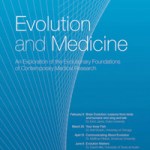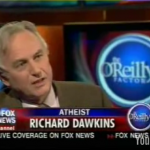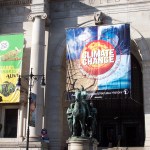Framing Science
Robert Scoble interviews science blogger and author Jennifer Ouellette about the Science & Entertainment Exchange, a "recent initiative by the National Academy of Sciences, was set up to build a new kind of social network of scientists and movie directors." Worth a watch:
I was sick Sunday, and I'm a bit off today, so everything is 36 to 48 hours off. So, my review of Unscientific America: How Scientific Illiteracy Threatens our Future will be delayed. In the mean time you can have a look at these items:
1) An interesting post by David Dobbs places the current discussion regarding religion and science in an historical context: PZ Myers, Chris Mooney, Asa Gray, and the religion-science divide
2) Stephanie Zvan at Almost Diamonds discusses the Mooney/Kirshenbaum strategy.
3) Stephanie also addresses this issue a bit more circumspectly in a post on "Mere…
Lousy Canuck has ramped up the metaphor with Two boats tethered together on a lake as his method of addressing the 1% solution. Also, there is now a very interesting post on Quiche Moraine regarding the Hollywood Case Study and the book Unscientific America.
See also this at Pharyngula.
... In which I narrow the gulf between two allied factions enough that with a running start you can jump across ... maybe.
It has been suggested that Accommodationism is "a more moderate atheist perspective on the nature of religion and science."1 In this view, religion and science are not antithetical, and can exist side by side.
I think this is a fair description of accommodationism, and it is what bothers me about accommodationism itself or the description of accommodationism, depending on who's doing the talking, but I also don't think that this is what certain people who have been…
Over at the NY Times' Dot Earth, Andrew Revkin has started a conversation with readers on the merits of framing as applied to climate change communication. Revkin takes as a point of departure the Seed magazine roundtable on the issue published a few weeks back. Revkin adds to the mix another voice on the matter, scientist-turned-filmmaker Randy Olson. In his remarks excerpted by Revkin, Olson correctly points out that it's not just the frame but also the source--or the spokesperson--that matters.
The full range of comments from readers is well worth reading. I weighed in with my own response…
I am back from an excellent science journalism conference in Denmark and will have more to say on the meeting which highlighted several issues that speak directly to challenges faced here in the US. But for now, I wanted to return to our Commentary article "Science Communication Re-Considered" published last week at Nature Biotechnology.
Of particular interest to readers, we discuss the rise of science blogging as just one small part of the complex puzzle which is public engagement. There is a lot to like about blogs but there is also a lot to be cautious about. Importantly, despite great…
In this month's issue of Nature Biotechnology, I join with other authors to suggest several bold new initiatives in science communication and journalism. The Commentary article includes an overview of key issues and trends in the field and closes with a series of specific recommendations.
The article is based on a workshop held this past year in Washington, DC, organized by Timothy Caulfield and Tania Bubela of the Health Law Institute at the University of Alberta. The authors reflect the participants in that workshop and include representatives from the U.S., Canada, the U.K., Germany and…
There is an interesting post on The Intersection called Civility and the New Atheists, by Chris Mooney. In the post, Chris reviews Barbara Forrest's statements that in engaging int he cross-world-view debate (scientists vs. creationists, atheists, vs religion, etc.) one should maintian etiquette, respect and understand diversity, and practice humility.
Atheist and pro-science writer Mooney notes in speaking of a talk by Forrest:
Forrest therefore concluded her talk by saying that we need are "epistemological and civic humility"-providing the groundwork for "civic friendship." To which I…
Randy Olson is a film maker and marine biologist who has focused in recent years on the critique of science communication. You may know him from his documentary work on the sexual practices of barnacles, the evolution-creation debate, or global warming.
Randy is coming out with a new book, Don't Be Such a Scientist: Talking Substance in an Age of Style. It will be available sometimes in August.
Here is a synopsis of the book:
"Don't Be Such a Scientist: Talking Substance in an Age of Style" has been 30 years in the making. It draws on Randy Olson's 15 years as a scientist (Ph.D. Harvard…
Earlier this month, I was honored to give a lecture co-sponsored by the NIH and National Academies at their historic downtown DC headquarters. The focus of the talk was on "Communicating about Evolution," part of a spring lecture series on evolution and medicine.
The video and the slides for the presentation are now online and include closed-captioning. I gave a similar presentation this past weekend in Pittsburgh at the Council of Science Editors' meetings. The presentation runs about 45 minutes with 30 minutes of Q&A.
For readers of this blog and followers of the "Framing Science"…
For DC readers, as part of a spring lecture series on evolution and medicine sponsored by NIH and the National Academies, I will be speaking tonight at 7pm at the National Academy of Sciences Auditorium at 2101 Constitution Avenue, NW (adjacent to the State Department and National Mall.) Go here for more information on the free talk.
The topic of the lecture is "Communicating about Evolution" and I will be discussing themes covered in recent articles and forthcoming book chapters. I previewed some of these themes in video interview segments last year with Big Think.
Here is a synopsis from…
Readers of this blog should find the arguments in Tom Friedman's column today familiar. On climate change, Friedman argues that it's time to switch focus from cap and trade to a carbon tax, a policy that most Americans can understand.
But switching policy is not enough, you also have to switch the frame from a dominant focus on impending catastrophe to a focus on economic development or "American renewal." Here's how Friedman explains this economic development frame:
We need a price on carbon because it will stimulate massive innovation in the next great global industry -- E.T. -- energy…
For readers in Denmark, Sweden, and Germany intrigued by the discussion over the past few days at Scienceblogs, the Danish Association of Science Journalists will be focusing on these exact same topics at their upcoming June meetings. Register at the site and see an agenda of speakers, with the roster not quite yet completed. At the conference, I will be giving a morning talk and participating in an afternoon panel discussion.
See below from the conference description on the relevance of framing to science communication:
For science journalists and the media in general, some important…
When pundits like Richard Dawkins use the trust and authority granted them as scientists to denigrate religious publics, is it unethical?
On issues such as climate change, nanotechnology, and evolution, research in the area of framing is being used to design and plan communication initiatives and to craft novel, accessible, and relevant narratives for nontraditional audiences across media formats. The intended outcomes include increased learning, dialogue, and public participation.
Yet what's still missing is a clear outline of the ethical and normative imperatives that apply to scientists,…
Matthew Nisbet says maybe, but not by much.
I
n the U.S., there is often the false assumption that Europeans are somehow more engaged and supportive of science than Americans. Yet, as I discuss in several studies and as I have written about in articles, instead of science literacy, the same generalizable interaction between values, social identity, and media portrayals drive European perceptions of science debates. Indeed, cross-national survey studies show that while science remains the most widely admired and respected institution in American society, Europeans are far more ambivalent…
When will the madness end? When the Republicans dry up and blow away, of course.
In the Republican response to Obama's State of the Union 2.0 address, by Bobby Jindal, governer of Louisiana, we heard this:
"Instead of monitoring volcanoes, what Congress should be monitoring is the eruption of spending in Washington, D.C.,"
The reason why volcanoes have been picked out of some speech writer's anal sphincter zone is because they erupt and they wanted the metaphor. Or because Jindal believes he has no volcanoes in his state (but he would be wrong) or because of some other rhetorical reason…
Just how important is public communication? Presidential Science Adviser John Holdren believes that scientists should devote 10% of their time to talking to the public about matters of science and policy, especially in the area of energy and climate. That's what he urged in the conclusion to his 2007 AAAS Presidential address and again last year at the energy summit sponsored by the National Academies. From the report to that summit:
"I suggested in my AAAS presidential address last year that everybody in the science and technology community who cares about the future of the world should be…
As I wrote last month, in the Year of Darwin, the loudest voice associated with science threatens to be Richard Dawkins and other New Atheist pundits who will argue their personal belief that evolution undermines the validity of religion or even respect for the religious. Certainly, this promises to be a big part of the publicity campaign behind Dawkins' forthcoming book on evolution.
In sharp contrast, the major science organizations such as AAAS and the National Academies are actively reaching out to religious leaders and groups. Another example is an event upcoming at the Center for…
On Thursday, Feb. 5, I will be at Virginia Commonwealth University giving a talk as part of the university's Science, Technology, and Society lecture series (details). It will be an updated and more polished version of the lecture I gave at the New York Academy of Sciences in December.
Then on Tues., Feb. 10 I will be in New York at the American Museum of Natural History participating in a stellar panel discussion on how the media covers climate change featuring Andrew Revkin of the NY Times, Bud Ward of the Yale Forum on Climate Change and the Media, Bill Blakemore of ABC News, and Diane…



